Our Location
304 North Cardinal St.
Dorchester Center, MA 02124

The Smoothstack lawsuit has sparked widespread attention, raising questions about the company’s business practices and their impact on employees. Smoothstack, known for its tech training and placement services, now faces serious allegations that could reshape the industry. Understanding the facts behind this lawsuit is essential for anyone in the tech sector.
What does this mean for professionals and businesses tied to Smoothstack? Let’s break down the key details and uncover the truth behind the case.
The lawsuit revolves around allegations of unfair practices in the company’s tech training and placement program. Smoothstack, a firm known for its “train-to-hire” model, is accused of breaching contracts and misrepresenting terms to trainees.
Critics claim the company’s agreements lock employees into unfavorable conditions, while Smoothstack maintains its program is transparent and beneficial.
This case has raised concerns among professionals in the tech industry, emphasizing the need to carefully review employment contracts.
The outcome of this lawsuit could have significant implications for similar companies and their practices.
Smoothstack’s business model is based on a “train-to-hire” approach, targeting aspiring tech professionals. They offer intensive training programs designed to prepare individuals for specialized IT roles. After training, participants are placed in jobs with partner companies, often under contractual agreements.
The model requires trainees to commit to working for a set period, ensuring Smoothstack recoups training costs. While many see this as a stepping stone into tech, critics argue that some contract terms are restrictive.
Understanding the details of Smoothstack’s contracts is crucial for anyone considering this program, as it directly impacts career flexibility and growth opportunities.
The allegations against Smoothstack center on claims of unfair practices in its training and employment contracts. Critics argue that the company’s agreements place undue restrictions on trainees, potentially limiting their career options.
Others claim misrepresentation in the program’s terms, leaving participants unaware of hidden obligations. These allegations have drawn attention to how such models operate in the tech industry.
Key Allegations Include:
These concerns highlight the importance of thoroughly understanding Smoothstack’s policies before signing up, as the lawsuit could set a precedent for similar businesses.
This lawsuit has raised significant concerns for tech workers and the broader industry. For employees, the allegations highlight potential risks in signing training-to-hire agreements without fully understanding their terms.
Many workers fear restrictive contracts could limit career mobility and place financial strain on those who want to leave early. On an industry level, this case has cast a spotlight on similar training programs, urging businesses to rethink how they structure agreements.
If Smoothstack is found liable, it could lead to stricter regulations and a push for greater transparency in employment practices.
The lawsuit has sparked widespread discussion across media outlets and online platforms. While some have praised the company for offering tech opportunities, critics and former trainees have shared negative experiences, fueling public skepticism.
Social media has amplified the debate, with professionals weighing in on the fairness of such programs. This intense scrutiny has put pressure on Smoothstack and similar firms to address allegations and improve their practices, as public opinion continues to shape the narrative around employment agreements in the tech sector.

Many former employees and trainees involved in the Smoothstack lawsuit have shared negative experiences, claiming they were misled about job placements and contract terms. Some allege that they were locked into agreements with little flexibility, causing frustration and financial strain.
These voices highlight the potential risks of entering into long-term contracts without fully understanding the obligations.
Smoothstack, on the other hand, defends its business model, stating that the training and job placement process is transparent and beneficial for those who complete the program.
The company maintains that its agreements are fair and in line with industry standards, emphasizing its role in helping tech professionals launch successful careers.
Legal experts suggest that the outcome of the Smoothstack lawsuit could have significant consequences for similar training programs. They anticipate that the case will spark more scrutiny around employment contracts and force companies to adopt clearer, more transparent terms for trainees.
READ: It Is Not Wisdom But Authority That Makes A Law. T – Tymoff
This lawsuit originated from allegations by former trainees and employees who claimed they were misled about the company’s training programs and job placement terms.
Many argue that the company’s contracts were overly restrictive, leaving participants with few options if they wanted to leave before completing their obligations. Complaints include accusations of misrepresentation regarding the training’s quality and job security after placement.
These issues sparked legal action, with plaintiffs seeking compensation for what they describe as unfair practices. The case highlights broader concerns about Smoothstack’s business model and training-to-hire agreements in the tech industry and has attracted attention from both legal experts and potential future trainees.
The Smoothstack lawsuit is primarily based on allegations of breach of contract and misrepresentation. Trainees claim that the terms of the company’s agreements were not clearly explained, leading to confusion and unfair expectations. Legal action was taken to seek compensation for financial damages and challenge the fairness of the contractual terms.
One key aspect of the lawsuit involves claims that the training-to-hire model closely resembles indentured servitude. Plaintiffs argue that the long-term work commitments, combined with high fees for early contract termination, create conditions that trap workers into unfavorable situations, limiting their professional freedom and financial mobility.
The Fair Labor Standards Act (FLSA) may play a role in the case, especially regarding whether Smoothstack’s practices comply with federal standards for wages, working hours, and employment conditions.
If the company’s contracts are found to violate FLSA guidelines, it could lead to significant legal consequences, potentially affecting similar training programs nationwide.
The lawsuit raises questions about the legal limits of contractual obligations in the tech industry. Specifically, it challenges whether restrictive clauses in training-to-hire agreements are enforceable under U.S. labor law. The case could set a precedent for how such contracts are reviewed and regulated in the future.
This lawsuit could have significant legal and financial implications for the company. If found liable, Smoothstack may face substantial financial penalties, including compensation to affected trainees and legal fees. A ruling against the company could also damage its reputation, leading to a loss of trust from future clients and trainees. Legal experts warn that this case may prompt more regulatory scrutiny of training-to-hire programs in general, making it harder for similar businesses to operate without clearer, fairer contracts.
The Smoothstack lawsuit could deeply affect the company’s daily operations and long-term viability. Smoothstack may be forced to overhaul its business model, especially the terms of its contracts, to avoid further legal challenges.
Potential changes could include increased transparency and modifications to the training process, making it more flexible for trainees. These adjustments could disrupt its current operations and force the company to invest in legal and public relations efforts to rebuild its image.
The case has broader implications for the tech training industry. A ruling in favor of the plaintiffs could prompt other companies to reevaluate their business practices, especially regarding training-to-hire agreements.
It may lead to more stringent regulations in the sector, ensuring that future contracts are more transparent and equitable. This lawsuit could serve as a wake-up call for businesses, urging them to treat trainees more fairly and comply with evolving labor laws.

The Smoothstack lawsuit shares similarities with other cases in the tech industry involving unfair employment practices and restrictive training contracts. Like many other firms, Smoothstack has been accused of misleading trainees about job placements and binding them to long-term, rigid contracts.
These types of training-to-hire agreements have faced legal challenges before, highlighting a growing concern about fairness and transparency in the tech sector.
There have been several cases in the tech industry where companies were accused of exploiting workers through unfair training agreements or misrepresenting job opportunities.
In many instances, employees claimed they were overpromised and underpaid, leading to lawsuits over breach of contract and violations of labor laws. These cases have pushed for better protections for workers in the tech sector.
Previous tech industry lawsuits have often resulted in settlements or policy changes. Some companies have been forced to revise their contracts, ensuring clearer terms and better protection for employees. In other cases, financial compensation has been awarded to workers who were misled or harmed by unfair practices.
The Smoothstack lawsuit could set a precedent for future cases, influencing how training programs and employment contracts are structured in the tech industry. It may lead to stricter regulations, ensuring that companies are held accountable for treating employees fairly and transparently.
The Smoothstack lawsuit highlights important issues regarding transparency, fairness, and worker rights in the tech industry. As the case unfolds, it could lead to significant changes in how training-to-hire models operate and be regulated.
For both workers and companies, understanding these legal challenges is crucial for shaping a more equitable future in tech employment. The outcome could set a valuable precedent for future cases, encouraging clearer, more just contracts across the industry.